"Whatever will bring in the most money will happen."
--ELINOR GLYN
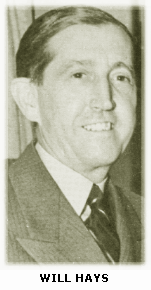 Will Hays, the Presbyterian elder newly drafted out of Warren Harding's Cabinet to clean up Hollywood in the wake of all that scandal, lest the box offices go to rot and ruin, pleaded with the masses not to judge hastily.
Will Hays, the Presbyterian elder newly drafted out of Warren Harding's Cabinet to clean up Hollywood in the wake of all that scandal, lest the box offices go to rot and ruin, pleaded with the masses not to judge hastily.
"The potentialities of motion pictures for moral influence and education are limitless," said the ex-Postmaster-General. "Therefore its integrity should be protected as we protect the integrity of our children and our churches, and its quality developed as we develop the quality of our schools . . .

"This industry must move toward that sacred thing, the mind of a child, toward that clean virgin thing, that unmarked slate, the same responsibility, the same care about the impressions made upon it, that the best clergyman or the most inspired teacher of youth would have."
Hays had a solid stake of his own in the matter. The studios' hurry-call to him during the Arbuckle mess carried a salary tag of $100,000-a-year--quite a pile of money in 1922. Mrs. Elinor Glyn, who wrote Three Weeks and found her exposition of the New Thought highly salable in Hollywood, offered The New York Times some much more candid observations than Will Hays was dispensing.
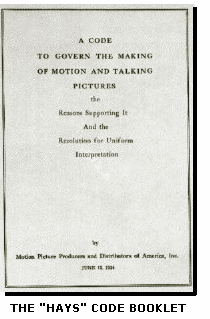 "The trouble with the movie industry," said Mrs. Glyn, a British import, "is that so many young people in it get rich suddenly. They are not taught control, and it is hard for them to resist temptation. A young girl acts with a handsome young star all day long in emotional scenes, and when she gets through she is apt to think that her husband is an awful bore. But I think in a short time you will see a vast improvement and that the standard will come up to that of the stage."
"The trouble with the movie industry," said Mrs. Glyn, a British import, "is that so many young people in it get rich suddenly. They are not taught control, and it is hard for them to resist temptation. A young girl acts with a handsome young star all day long in emotional scenes, and when she gets through she is apt to think that her husband is an awful bore. But I think in a short time you will see a vast improvement and that the standard will come up to that of the stage."
The sudden-riches theme drew wide notice. "When people spring from poverty to affluence within a few weeks," said a New York Journal correspondent in Hollywood, "their mental equipment is not always equal to the strain. They have money, an unaccustomed toy, and they spend in bizarre ways. They may indulge in 'wild parties' or they may indulge in other forms of relaxation and excitement. Many of them spend all they make . . . Since Prohibition came in many of them who had no liquor stocks turned to other stimulants. The dealers in illicit drugs found a growing market." But the Journal man said these gray items applied only to a "relatively small group" in the movie mill.
 Mrs. Glyn, for her part, pointed out that many stars contributed lavishly to charities rather than burn up their fat paychecks on the high life. Asked what should be done about the other kind of people in Hollywood, her answer was firm.
Mrs. Glyn, for her part, pointed out that many stars contributed lavishly to charities rather than burn up their fat paychecks on the high life. Asked what should be done about the other kind of people in Hollywood, her answer was firm.
 "If they are flagrantly immoral, hang them; do not show their pictures; suppress them; but do not make them all suffer for a few. This Arbuckle party was a beastly, disgusting thing and things like it should be stamped out. But I didn't see any such things in Hollywood and if there are dope parties there, they must be very small." The gentleman from The Times wanted to know what would happen in Hollywood in the wake of the Arbuckle and Taylor scandals.
"If they are flagrantly immoral, hang them; do not show their pictures; suppress them; but do not make them all suffer for a few. This Arbuckle party was a beastly, disgusting thing and things like it should be stamped out. But I didn't see any such things in Hollywood and if there are dope parties there, they must be very small." The gentleman from The Times wanted to know what would happen in Hollywood in the wake of the Arbuckle and Taylor scandals.
"Whatever will bring in the most money will happen," Mrs. Glyn replied.
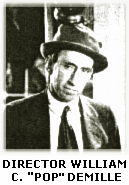 The lady wasn't far off. The Hays Office issued a double proclamation: none but the most decorous and antiseptic movies could thenceforth pass the censors and everybody had to behave off--screen too. Quick like a flash, the studios inserted morals clauses in all contracts which in essence made the male stars monks and the females akin to the Little Sisters of the Poor. Everybody had to take the vows or else.
The lady wasn't far off. The Hays Office issued a double proclamation: none but the most decorous and antiseptic movies could thenceforth pass the censors and everybody had to behave off--screen too. Quick like a flash, the studios inserted morals clauses in all contracts which in essence made the male stars monks and the females akin to the Little Sisters of the Poor. Everybody had to take the vows or else.
William C. DeMille, brother of Cecil, cited the instance of a biblical epic in defense of the morals clause. "It would never do," he said, "to have the Virgin Mary getting a divorce, or St. John cutting up in a nightclub."
No, it would never do.
Not at that moment, anyway.
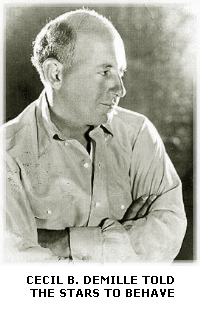 Lest a very large Hollywood name be taken in vain, let it be noted here that Cecil B. DeMille--even then a Colossus in the movie mills--did not introduce the Blue Law approach to Hollywood. Far from it. Before the Czar Hays swung his bludgeon, the Great Director had made movies under such provocative titles as Don't Change Your Husband, Adam's Rib, Why Change Your Wife?, Forbidden Fruit, For Better or Worse, and The Golden Bed. Indeed, DeMille wielded the first megaphone on a whole assortment of intimate scenes that made the movie bedroom what it is today.
Lest a very large Hollywood name be taken in vain, let it be noted here that Cecil B. DeMille--even then a Colossus in the movie mills--did not introduce the Blue Law approach to Hollywood. Far from it. Before the Czar Hays swung his bludgeon, the Great Director had made movies under such provocative titles as Don't Change Your Husband, Adam's Rib, Why Change Your Wife?, Forbidden Fruit, For Better or Worse, and The Golden Bed. Indeed, DeMille wielded the first megaphone on a whole assortment of intimate scenes that made the movie bedroom what it is today.
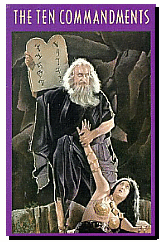 As Lloyd Morris put it in Not So Long Ago, "The DeMille boudoir became a chapel for the celebration of rites authorized by custom, but still accounted irregular by the law and the church." Morris also credited DeMille with changing the meaning of the word "sleep," at least for the more attentive movie-goers. But DeMille could go either way with the Hollywood winds. He made The Ten Commandments the year after the Arbuckle-Taylor scandals, so he did as much as anyone to reduce the great sweat under Will Hays' high-starched collar.
As Lloyd Morris put it in Not So Long Ago, "The DeMille boudoir became a chapel for the celebration of rites authorized by custom, but still accounted irregular by the law and the church." Morris also credited DeMille with changing the meaning of the word "sleep," at least for the more attentive movie-goers. But DeMille could go either way with the Hollywood winds. He made The Ten Commandments the year after the Arbuckle-Taylor scandals, so he did as much as anyone to reduce the great sweat under Will Hays' high-starched collar.



 Will Hays, the Presbyterian elder newly drafted out of Warren Harding's Cabinet to clean up Hollywood in the wake of all that scandal, lest the box offices go to rot and ruin, pleaded with the masses not to judge hastily.
Will Hays, the Presbyterian elder newly drafted out of Warren Harding's Cabinet to clean up Hollywood in the wake of all that scandal, lest the box offices go to rot and ruin, pleaded with the masses not to judge hastily.
 "The trouble with the movie industry," said Mrs. Glyn, a British import, "is that so many young people in it get rich suddenly. They are not taught control, and it is hard for them to resist temptation. A young girl acts with a handsome young star all day long in emotional scenes, and when she gets through she is apt to think that her husband is an awful bore. But I think in a short time you will see a vast improvement and that the standard will come up to that of the stage."
"The trouble with the movie industry," said Mrs. Glyn, a British import, "is that so many young people in it get rich suddenly. They are not taught control, and it is hard for them to resist temptation. A young girl acts with a handsome young star all day long in emotional scenes, and when she gets through she is apt to think that her husband is an awful bore. But I think in a short time you will see a vast improvement and that the standard will come up to that of the stage." Mrs. Glyn, for her part, pointed out that many stars contributed lavishly to charities rather than burn up their fat paychecks on the high life. Asked what should be done about the other kind of people in Hollywood, her answer was firm.
Mrs. Glyn, for her part, pointed out that many stars contributed lavishly to charities rather than burn up their fat paychecks on the high life. Asked what should be done about the other kind of people in Hollywood, her answer was firm. "If they are flagrantly immoral, hang them; do not show their pictures; suppress them; but do not make them all suffer for a few. This Arbuckle party was a beastly, disgusting thing and things like it should be stamped out. But I didn't see any such things in Hollywood and if there are dope parties there, they must be very small." The gentleman from The Times wanted to know what would happen in Hollywood in the wake of the Arbuckle and Taylor scandals.
"If they are flagrantly immoral, hang them; do not show their pictures; suppress them; but do not make them all suffer for a few. This Arbuckle party was a beastly, disgusting thing and things like it should be stamped out. But I didn't see any such things in Hollywood and if there are dope parties there, they must be very small." The gentleman from The Times wanted to know what would happen in Hollywood in the wake of the Arbuckle and Taylor scandals.
 The lady wasn't far off. The Hays Office issued a double proclamation: none but the most decorous and antiseptic movies could thenceforth pass the censors and everybody had to behave off--screen too. Quick like a flash, the studios inserted morals clauses in all contracts which in essence made the male stars monks and the females akin to the Little Sisters of the Poor. Everybody had to take the vows or else.
The lady wasn't far off. The Hays Office issued a double proclamation: none but the most decorous and antiseptic movies could thenceforth pass the censors and everybody had to behave off--screen too. Quick like a flash, the studios inserted morals clauses in all contracts which in essence made the male stars monks and the females akin to the Little Sisters of the Poor. Everybody had to take the vows or else. Lest a very large Hollywood name be taken in vain, let it be noted here that Cecil B. DeMille--even then a Colossus in the movie mills--did not introduce the Blue Law approach to Hollywood. Far from it. Before the Czar Hays swung his bludgeon, the Great Director had made movies under such provocative titles as Don't Change Your Husband, Adam's Rib, Why Change Your Wife?, Forbidden Fruit, For Better or Worse, and The Golden Bed. Indeed, DeMille wielded the first megaphone on a whole assortment of intimate scenes that made the movie bedroom what it is today.
Lest a very large Hollywood name be taken in vain, let it be noted here that Cecil B. DeMille--even then a Colossus in the movie mills--did not introduce the Blue Law approach to Hollywood. Far from it. Before the Czar Hays swung his bludgeon, the Great Director had made movies under such provocative titles as Don't Change Your Husband, Adam's Rib, Why Change Your Wife?, Forbidden Fruit, For Better or Worse, and The Golden Bed. Indeed, DeMille wielded the first megaphone on a whole assortment of intimate scenes that made the movie bedroom what it is today. As Lloyd Morris put it in Not So Long Ago, "The DeMille boudoir became a chapel for the celebration of rites authorized by custom, but still accounted irregular by the law and the church." Morris also credited DeMille with changing the meaning of the word "sleep," at least for the more attentive movie-goers. But DeMille could go either way with the Hollywood winds. He made The Ten Commandments the year after the Arbuckle-Taylor scandals, so he did as much as anyone to reduce the great sweat under Will Hays' high-starched collar.
As Lloyd Morris put it in Not So Long Ago, "The DeMille boudoir became a chapel for the celebration of rites authorized by custom, but still accounted irregular by the law and the church." Morris also credited DeMille with changing the meaning of the word "sleep," at least for the more attentive movie-goers. But DeMille could go either way with the Hollywood winds. He made The Ten Commandments the year after the Arbuckle-Taylor scandals, so he did as much as anyone to reduce the great sweat under Will Hays' high-starched collar.